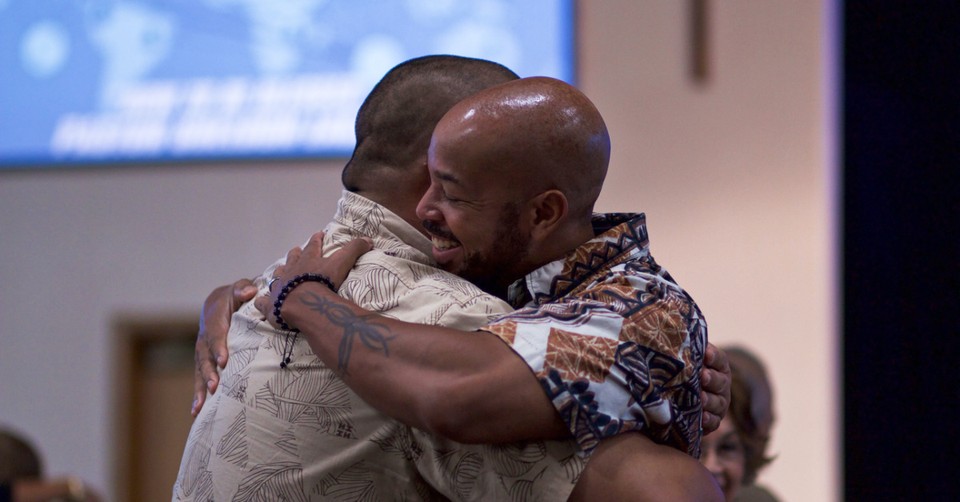4 Keys for Building a Thriving Men’s Ministry at Your Church

Every man has great potential to influence others, positively or negatively.
When a father has a close relationship with his kids, those children have higher IQs, have fewer psychological problems, avoid high-risk behaviors, and are less likely to drop out of school. When those kids become adults, they tend to have high-paying jobs and healthy relationships.
A dad also has a huge influence on the faith practices of his children. When children observe their dad attending church regularly, nearly 75 percent of those children will become churchgoers as adults. Even when a father attends irregularly, the odds are better than 50 percent that his children will come to church, as least occasionally, as adults.
The sphere of influence of a man extends far beyond his home. “When a man goes all-in for Jesus, he has a positive impact in his workplace, his community, and his church,” says Kevin Harris, president of Radical Mentoring. “He becomes a more generous giver, both of his time and treasure, and he exhibits more passion, more depth, and more commitment. His friends are attracted to how he lives, and he begins to draw other men to Jesus.”
A proven way to get more of a church’s men on fire for Jesus is with a vibrant men’s ministry. But few churches have one.
Occasional Events + A Few Groups = Minimal Impact
What most churches offer instead is a smattering of men’s events and a few men’s groups.
Men’s events may include a quarterly pancake breakfast, an annual retreat, and an occasional evening or weekend gathering with a special speaker or program. While these events may attract quite a few of the men in the church – and even a few friends from outside the church – the impact on attendees tends to be short-lived.
Men’s groups have a longer-term impact because they meet regularly. But these groups tend to attract a very small percentage of the men in a church. A men’s Bible study that meets before dawn on Monday or Saturday typically draws the same small, tight-knit group that has been attending for 15 years. A shared-interest group attracts only those men with that interest and the time to meet.
But you don’t have to settle for “business as usual” in men’s ministry, says Harris.
“If your current men’s ministry is stuck, or dying, or ineffective, there is a way to breathe new life into it,” he continues. “The results might not show up immediately. But over time, no ministry can stand still when God grows all-in men and sends them on His mission for His church.”
Here are four keys to building a thriving men’s ministry at your church:
1. Take the Initiative
Most pastors recognize the value of men’s ministry and would like to see vibrant men’s ministry in their churches.
But pastors are overloaded. And the pandemic has increased their workloads and stress levels. As a result, most pastors don’t have enough available bandwidth to lead the effort to build a strong men’s ministry.
Fortunately, they don’t have to. They just need to commit to a process and empower the man – or small team of men – who will lead that process.
Leaders should be men who are spiritually, emotionally, and relationally mature and respected by other men of the church. They need to be passionate about seeing other men pursuing Jesus to grow deeper in their faith. And they must be willing to “get real” with other guys.
“Men need authenticity,” says Harris. “They are tired of the sterilized versions of men that they see on Sunday mornings. To lead other men, you have to show them the real you, warts and all.”
2. Aim for Discipleship
How does a stagnant men’s ministry become a vibrant, intergenerational ministry that develops men into spiritual leaders in their homes, in their communities, and in the marketplace? The key, says Harris, is mentoring.
“At hundreds of churches, we’ve seen mentoring become the difference maker,” he says. “Mentoring creates an environment where men get off the sidelines and into the game.” As mentors pour into other men, those men develop into mentors themselves, and more and more men grow deeper in their faith.
Isn’t mentoring actually discipleship?
“Yes,” says Harris. “It's just a different word for it. Discipleship is a churchy word, and churchy words can be intimidating. A guy may shy away from discipleship because he really doesn’t know what it means.”
The idea of mentoring, on the other hand, makes sense to a lot of guys. “They are familiar with mentoring from other contexts, such as the business world,” continues Harris.
The kickoff of a mentoring or discipleship group is a time when the guys meet each other by telling their stories. The mentor goes first and sets the tone.
“If he gives the Sunday morning version of his story, all cleaned and buttoned up, then everyone else will do the same thing, and the men really won’t get to know each other,” says Harris. “But if the mentor is real with the rest of the guys, then they’re more likely to be real with him and each other.”
3. Form Your Groups
How do you form your first mentoring or discipleship groups? The best approach depends on how many mentors you have.
If you have just a few, then those mentors should work together – and with church leadership – to determine the makeup of the initial groups.
“Identify younger guys in the church who are believers with a lot of potential for leadership,” advises Harris. Once the mentors have a list, they will personally invite each of the men on the list to apply for a group. “Personal invitations are huge because they communicate the importance and rarity of the opportunity,” says Harris. “Invitations must convey that participants are making a covenant commitment to attend every session, do the work, and eventually pay it forward.”
If you have more mentors, then you may want to use a big event as an opportunity to invite men to join groups. Many men at such an event may be interested in, and in need of, discipleship.
“The guy sitting next you at a men's breakfast may be going through a battle that you just got through,” says David Dusek, founder of Rough Cut Men Ministries. “But you’ll never know it if you just talk about your favorite football team.”
Men, he says, respond to transparency. Some may respond immediately and accept an invitation to join a discipleship group. Others may need more time.
“The biggest challenge that most men face is that they don't trust anybody,” Dusek continues. “And because they don't trust anybody, they don’t have relationships with other men at church.” Friendships between men can develop through non-discipleship groups at a church, such as common-interest groups. And those relationships can open the door to discipleship.
4. Don’t Reinvent the Wheel
Most men like structure, so mentors should offer a structured approach in their groups. Rather than creating a program from scratch, mentors should look at proven programs from organizations that focus on men’s discipleship . . . and see value in men developing strong relationships with other men.
“Look at the epidemics facing men,” says Harris. “Our life expectancy is down. Our health is down. Suicides are up. Drug use is all up. We’re going through trauma. And we’re doing it alone. We’re isolated. Friendless. This is playing itself out in all areas of society.”
The answer, he says, is strong bonds with other men who have found answers, and hope, in Christ.
The answer is Christian mentoring. Or discipleship.
After all, they’re the same thing.
Photo Credit: Erika Giraud/Unsplash

Originally published October 22, 2024.





